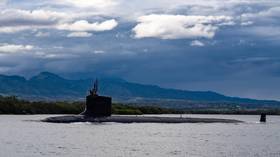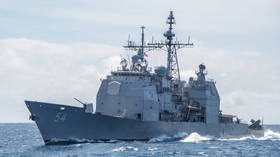Australia vows to protect US nuclear ‘crown jewels’

Australia has insisted it will keep US nuclear propulsion technology under tight lock and key after it gains access to sensitive information, with Canberra’s envoy to Washington pledging to safeguard America’s “crown jewels.”
Speaking to an audience at a US think tank on Thursday, outgoing Ambassador Arthur Sinodinos said much progress had been made on the three-way AUKUS deal signed between the US, Australia, and the UK in 2021, the details of which are set to be unveiled later this month.
“The very fact that the Americans are prepared to share their crown jewels with us implies that there will have to be progress on the seamless transfer of technology. None of us want this to be bogged down,” he told the Center for Strategic and International Studies in Washington, DC.
“And I think that state of mind has now permeated through various levels of the [US] administration,” Sinodinos added.
Though the particulars of the submarine technology transfer have not been made public, Sinodinos stated that Australia has “assured Americans” and demonstrated “the sort of protection of information measures that we take to make sure they understand that their technology is safe in terms of leakage to third parties.”
The US maintains tight export controls on certain military hardware, which has created obstacles for past weapons transfers abroad. Sinodinos suggested Australia could be granted an exemption under the American regulations, saying “work is underway” but “it's not finished.”
In December, US Defense Secretary Lloyd Austin met with his British and Australian counterparts to further hammer out the AUKUS deal, declaring that Washington is committed to furnishing new capabilities to Australia “at the earliest possible date.” At the time, Canberra’s defense chief, Richard Marles, spoke of an “enormous sense of shared mission” between the three allies, also noting that the US rarely shares its nuclear technology, even with close partners.
Asked about the precautions Australia would take to protect sensitive information given its lack of a domestic nuclear propulsion industry, Marles said on Friday that the technology would be kept under the “highest degree” of security.
“In a short period of time we’ll be announcing the optimal pathway for Australia acquiring a nuclear-powered submarine capability, and being a nuclear steward in this context is a really important part of that announcement,” he told reporters. “It does involve a really significant hardening of security in a physical sense, with buildings and fences and the like, but also in an IT sense.”
The trilateral AUKUS pact has come under fire from Russia and China. Last month, officials in Beijing slammed the deal for promoting “nuclear proliferation” in the Indo-Pacific region. Russia has echoed similar concerns, warning that the US, UK, and Australia would soon become a “military-political alliance” and seek to spark a new conflict in Asia.














